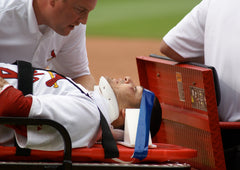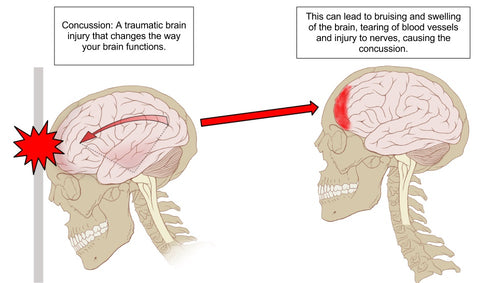Rugby Blog
Concussion in Rugby
by Leana Kell
A major study of rugby union players in 2012 conducted at the Auckland University of Technology, found there was a potential link between frequent concussion and brain function. The research, funded by World Rugby over a period of 29 months, studied a mixture of 485 amateur and professional rugby players with matched control groups.
Despite World Rugby stating it was "difficult" to draw strong conclusions from the study, Professor Patria Hume said it was "irresponsible" to ignore the link, that rugby players who had suffered four or more concussions performed worse in tests measuring mental and physical coordination, motor speed and multi-tasking.
The latest annual injury audit for English rugby shows that the number of reported concussions rose by 59% in 2013-14 compared to the previous season. Below, Centurion looks at Rugby Union's most common injury in more depth.
What is concussion?
Concussion occurs when the brain is shaken inside the skull by a blow to the head and may be followed by symptoms such as confusion, memory loss or dizziness. In severe cases, concussion can lead to loss of consciousness. Concussion has been referred to as the "invisible injury" - no brain scans or blood tests can confirm it.

What causes concussion?
Concussion can be caused by a direct blow to the head or body and from whiplash type movements of the head and neck that can occur when a player is tackled or collides with another player or the ground. Immediately following a suspected concussion, the brain is susceptible to further significant damage in the event of another impact.
Visible clues of a suspected concussion
It is important to recognise the immediate effects of concussion on a rugby player. A player may be concussed if they immediately display one or more of the following symptoms:
- Lying motionless on ground
- Slow to get up
- Unsteady on feet
- Balance problems or falling over
- Grabbing/Clutching head
- Dazed, blank or vacant look
- Confused/Not aware of plays or events
- Suspected or confirmed loss of consciousness
- Loss of responsiveness
Long-term symptoms of concussion
A rugby player may be suffering from concussion if they display any of the following symptoms:
- Headache
- Dizziness and balance problems
- Fatigue/sleeping more often
- Mood swings/depression/crying
- Sleep disturbances such as night terrors
- Visual disturbances (flashing colours)
- Increased sensitivity to light and noise
Effects of concussion
Ignoring the signs and symptoms of concussion could result in death, a more serious brain injury or a prolonged recovery period. Furthermore, returning to play before complete resolution of the concussion exposes players to recurrent concussions that may become even worse.
Finlay Barnham, a Nottingham scrum half, was forced to retire in 2015 at the age of 24 after sustaining 8 concussions throughout his rugby career. He displayed symptoms as a result of his concussion to include dizziness and balance problems, mood swings and depression as well as visual disturbances, night terrors, short-term memory loss and sickness.
Barnham said; “There will always be risks in rugby. If you want to play, then play, but you would have to use your own judgement. If you don’t want to play because of the risk of getting hurt then rugby as a whole is not for you.
"The professional game players are getting bigger and faster and a significant blow to the head from these large athletes will likely cause a concussion.”
Improvements to the game

- World Rugby has stated that "player welfare, especially concussion" is the "number-one priority" when considering changes to the laws of the game. Below is a list of improvements that have already been made to the game, to help prevent concussion on the pitch.
- Video monitoring during matches has been introduced and medical teams are now at pitchside to help with the immediate effects of concussion.
- Rugby clubs are educating players in what concussion is and its effects, whilst making it clear that those players who take part do so at their own risk.
- Rugby players are taught to keep their heads out of the way when they make a tackle.
- There is a continuing debate over whether the 10-minute Head Injury Assessment (HIA) during matches should be scrapped, and any players showing any signs of concussion simply removed from the field.
- Saracens’ players are wearing GPS-technology patches behind the ears to gather data on collisions; their results have yet to be revealed.
- It is felt that having two referees on the field could enhance player welfare; this has already been tested in New Zealand's national provincial championship.
- It has been advised that players with suspected concussion should undergo a blood test after a match to either confirm concussion or rule it out. Players passing the HIA would then know if they were free from brain injury, before returning to the game.




